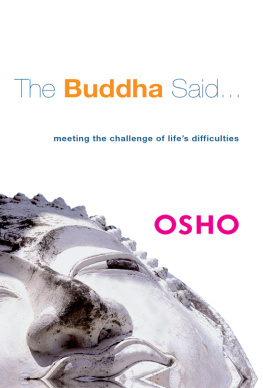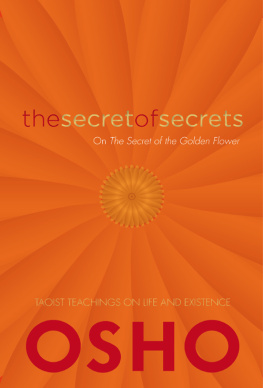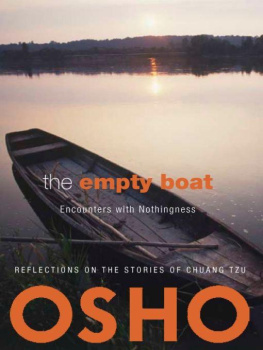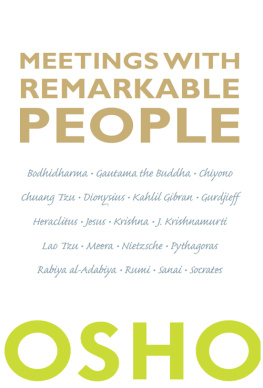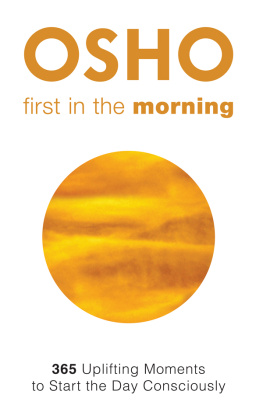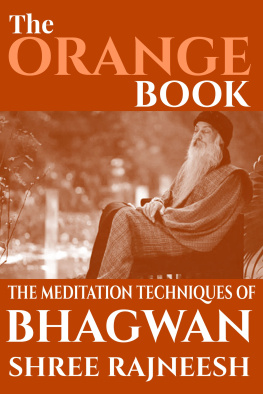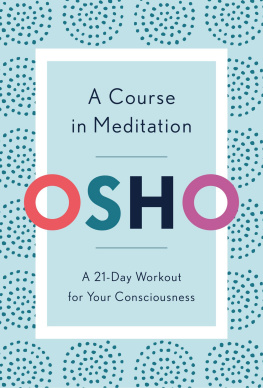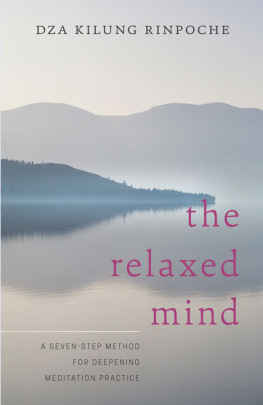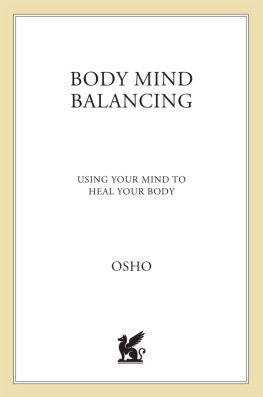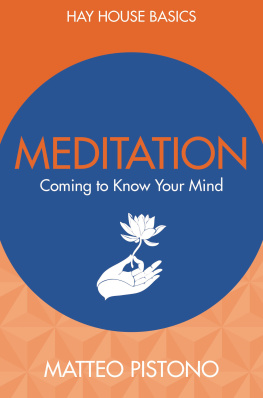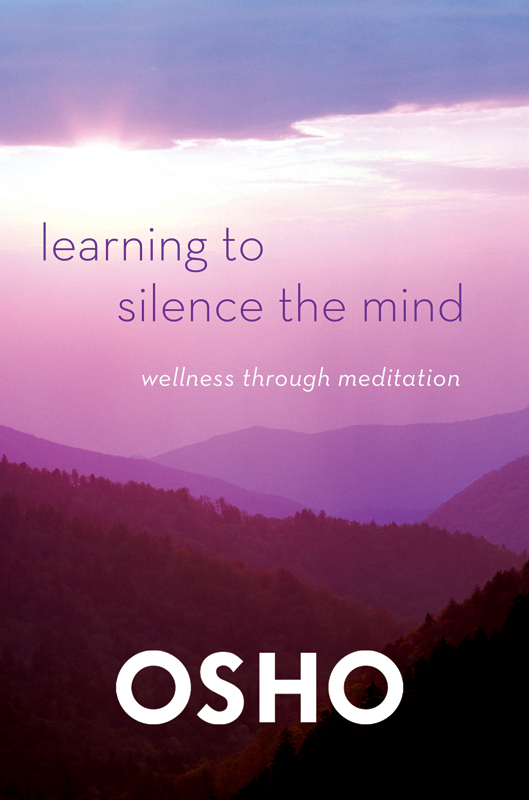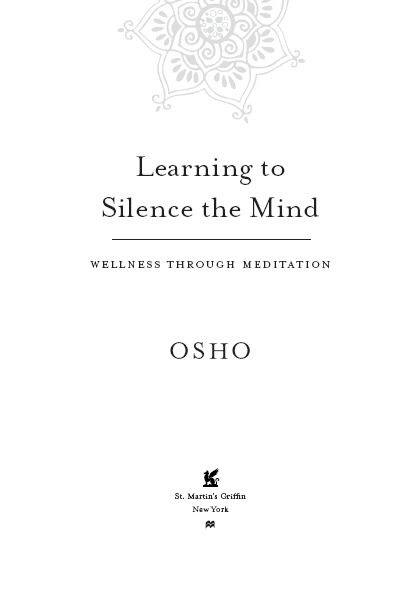
The author and publisher have provided this e-book to you for your personal use only. You may not make this e-book publicly available in any way. Copyright infringement is against the law. If you believe the copy of this e-book you are reading infringes on the authors copyright, please notify the publisher at: us.macmillanusa.com/piracy.
Contents
What Is Meditation?
TO SAY SOMETHING ABOUT MEDITATION IS a contradiction in terms. It is something which you can have, which you can be, but by its very nature you cannot say what it is. Still, efforts have been made to convey it in some way. Even if only a fragmentary, partial understanding arises out of it, that is more than one can expect. But even that partial understanding of meditation can become a seed. Much depends on how you listen. If you only hear, then even a fragment cannot be conveyed to you, but if you listen. Try to understand the difference between the two.
Hearing is mechanical. You have ears, you can hear. If you are getting deaf then a mechanical aid can help you to hear. Your ears are nothing but a certain mechanism to receive sounds. Hearing is very simple: Animals hear, anybody who has ears is capable of hearingbut listening is a far higher stage.
Listening means: When you are hearing, you are only hearing and not doing anything elseno other thoughts in your mind, no clouds passing in your inner skyso whatever is being said reaches you, as it is being said. There is no interference from your mind; it is not interpreted by you, by your prejudices; not clouded by anything that, right now, is passing within youbecause all these are distortions.
Ordinarily it is not difficult; you go on managing just by hearing, because the things you are hearing concern common objects. If I say something about the house, the door, the tree, the bird, there is no problem. These are common objects; there is no need of listening. But there is a need to listen when we are talking about something like meditation, which is not an object at all; it is a subjective state. We can only indicate it. You have to be very attentive and alertthen there is a possibility that some meaning reaches you.
Even if a little understanding arises in you, it is more than enough, because understanding has its own way of growing. If just a little bit of understanding falls in the right place, in the heart, it starts growing of its own accord.
First try to understand the word meditation. It is not the right word for the state about which any authentic seeker is bound to be concerned. So I would like to tell you something about a few words. In Sanskrit we have a special word for meditation, the word is dhyana . In no other language does a parallel word exist; the word is untranslatable. It has been recognized for two thousand years that this word is untranslatable for the simple reason that in no other language have people tried it or experienced the state that it denotes; so those languages dont have the word.
A word is needed only when there is something to say, something to designate. In English there are three words: the first is concentration . I have seen many books written by very well-meaning people, but not people who have experienced meditation. They go on using the word concentration for dhyanadhyana is not concentration. Concentration simply means your mind focused on one point; it is a state of mind. Ordinarily the mind is continuously moving, but if it continuously moves you cannot work with the mind on a certain subject.
For example, in science concentration is needed; without concentration there is no possibility of science. It is not surprising that science has not evolved in the EastI see these deep inner connectionsbecause concentration was never valued. For religiousness something else is needed, not concentration.
Concentration is mind focused on one point. It has its utility, because then you can go deeper and deeper into a certain object. Thats what science goes on doing: finding out more and more about the objective world. A person with a mind that is continuously roaming around cannot be a scientist.
The whole art of the scientist is to be capable of forgetting the whole world and putting your whole consciousness on just one thing. And when the whole consciousness is poured into one thing, then it is almost like concentrating sun rays through a lens: Then you can create fire. Those rays themselves cannot create fire because they are diffused; they are going farther away from each other. Their movement is just the opposite of concentration. Concentration means rays coming together, meeting on one point; and when so many rays meet on one point they have enough energy to create fire.
Consciousness has the same quality: Concentrate it, and you can penetrate deeper into the mysteries of objects.
I am reminded of a story about Thomas Alva Edison, one of the great scientists of North America. He was working on something with such concentration, and when his wife came with his breakfast she saw that he was so much involved that he had not even heard her coming. He had not even looked at her, he was not aware that she was there. She knew that this was not the right time to disturb him. Of course the breakfast will get cold but he will be really angry if I disturb himone never knows where he is. So she simply put the breakfast by his side, so that whenever he came back from his journey of concentration he would see the breakfast and eat it.
But what happened? In the meantime a friend dropped byhe also saw Edison so concentrated, and he looked at the breakfast getting cold and said, Better let him do his work. I will take the breakfast, it is getting cold. He ate the breakfast, and Edison was not even aware that this friend was there.
When he returned from his concentration, Edison looked around, saw the friend and saw the empty plates. He told the friend, Please forgive me. You came a little late and I have already taken my breakfast. Obviously, because the plates were empty, somebody had eaten, and who else could have eaten it? He must have! The poor friend didnt know what to do. He had been thinking to give Edison a surprise, but this man had given him a bigger surprise: He said, You came a little late.
But the wife was watching the whole thing. She came in and she said, He has not come late, you have come late! He has finished your breakfast. I was watching, but I saw that it was getting cold anyway; at least somebody ate it. You are some scientist! How you manage your science I cannot understand.
Concentration is always the narrowing of your consciousness. The narrower it becomes, the more powerful it is. It is like a sword that cuts into any secret of nature: You have to become oblivious of everything. But this is not meditation. Many people have misunderstoodnot only in the West, but in the East, too. They think that concentration is meditation. It gives you tremendous powers, but those powers are of the mind.
For example, in 1920 the king of Varanasi in India went through surgeryand created news all over the world because of his operation. He refused to take any anesthetic. He said, I have taken a vow not to take anything that makes me unconscious, so I cannot be put under chloroform; but you need not be worried.
It was a major operation, to remove his appendix. Now, to take out somebodys appendix without giving him anesthetics is really dangerous; you may kill the man. He may not be able to bear the pain, because the pain is going to be terrible. You have to cut his abdomen; you have to cut out his appendix, you have to remove it. It will take one hour, two hoursand one never knows in what condition the appendix is.


